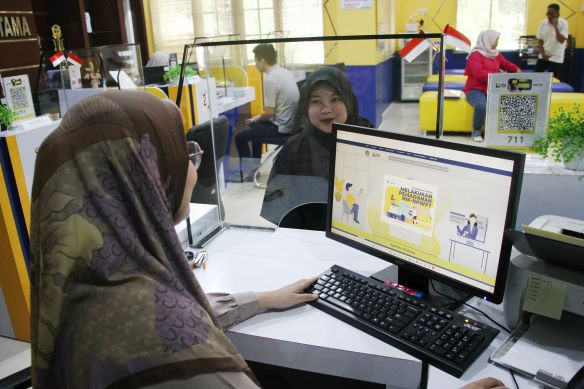Poland commemorate victims of World War II genocide
This law amendment is based on the need to ensure citizens’ trust in the state, to implement the principle of legal certainty, and to protect public order.
Change Size
 Poland's Prime Minister Mateusz Morawiecki speaks in the building of the so-called (Reuters/Kacper Pempel)
Poland's Prime Minister Mateusz Morawiecki speaks in the building of the so-called (Reuters/Kacper Pempel)
T
he article “Israel: Confronting Central European Revisionism” by James M. Dorsey in The Jakarta Post on July 9, 2021 contained many inaccuracies about Poland’s endeavors to commemorate victims of the genocide committed by the German occupiers on its territory during World War II.
It also contained many unproven simplifications and generalizations on the recent amendment of the Act – Code of Administrative Procedure, adopted on June 24 by the Polish Sejm (lower chamber of the Parliament).
Poland attaches great importance to commemorating victims of the genocide committed by the German occupiers on its territory during World War II. Numerous initiatives are being taken and significant resources are allocated for commemorating Jewish cultural heritage, the Holocaust and its victims.
Each year, Poland provides substantial funding to support victims of war and repression, for example in the form of social benefits. Reliable knowledge and awareness of the Holocaust is disseminated through educational and research activities, and museum initiatives. Poland also takes comprehensive care of former German Nazi concentration camps, German Nazi death camps, cemeteries and other places commemorating victims of repression.
The Polish government was disappointed with Israeli foreign minister Yair Lapid’s reaction to the proposed amendment to the Polish Code of Administrative Procedure. This law does not discriminate against any person or any particular group, nor is it intended to antagonize any party, including Israel or the Jewish diaspora. Its purpose is to restore the conformity of law with the Polish Constitution and to protect the principle of legal certainty, a principle which is necessary in any state governed by the rule of law.
The act amending the Act – Code of Administrative Procedure results from the obligation to implement the Constitutional Tribunal’s ruling of May 12, 2015 on the Polish legal system. The tribunal ruled that the situation where no time limit applies to the possibility of declaring invalid the administrative decisions issued in a flagrant breach of law is contrary to the principle of a democratic state of law.
The adoption of the act by the Sejm to implement the tribunal’s ruling is a legal consequence of the judgment and a duty of the authorities. The adopted act provides for a limit of 30 years during which an administrative decision can be declared invalid as a result of the decision having been issued in a flagrant breach of law.
This law amendment is based on the need to ensure citizens’ trust in the state, to implement the principle of legal certainty, and to protect public order. The current legal situation made it possible for administrative decisions to be declared invalid within an indefinite time frame on the grounds that they had been adopted without any legal basis or in a flagrant breach of law.
As a result anyone, a Polish citizen or a foreigner, who felt their rights were breached have had, for a long period of time, an opportunity to challenge decisions concerning them. However, this also led to lamentable situations where tens of thousands of people were deprived of the property of their entire life and forced out from apartments inhabited by their families for several generations.
Often, those operations were carried out in a criminal manner, using false documents or corruption. It happened that the courts regarded as alive people who, at the moment of passing the judgment, would have been 130 years old – solely for the purpose of transferring real estate to the alleged representatives of such individuals.
The Polish Constitutional Tribunal ruled that such a situation could not be reconciled with the Constitution and that a time limit must be set for declaring the invalidity of administrative decisions. Stabilization of facts after a fixed time is in the interest of public order, enhances legal security and safeguards an individual’s faith in the state and its laws. Declaring invalidity of a decision is an exception to the principle of respecting the stability of a final administrative decision and cannot be unlimited in time. Such a situation gives rise to uncertainty as to the existing legal relationship and creates the impression that a decision is provisional.
The amended provisions will only apply to administrative proceedings, including reprivatization proceedings. Entitled individuals will still be able to pursue their rights, including in civil proceedings, to obtain compensation for illegal seizure of property. Polish law has offered such a possibility for a long time and nothing is going to change in this regard.
The amendment will apply exclusively to administrative proceedings in which action has been taken to challenge administrative decisions issued in a distant past. The amended provisions will apply regardless of the nationality or origin of the parties. They are therefore nondiscriminatory.
Polish law allows all entitled individuals, irrespective of their nationality or origin, including foreigners, to pursue their rights to property lost due to postwar nationalization.
I strongly believe that evidenced-based, fair and unbiased public discussion is something very much needed in current times regarding all aspects of historical and present relations between nations.
Poland as a country that lost 6 million citizens during World War II killed by both Nazi Germany and the Soviet Union is open to pursue discussion regarding all aspects of the German and Soviet occupation of Polish territory. But this discussion must be just and evidence-based. This is the only way to understand the past and to build the brighter future.
***
The writer is ambassador of the Republic of Poland to Indonesia.









